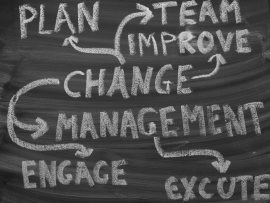In the ever-evolving landscape of the modern workplace, talent management has become a strategic imperative for organizational success. Employsolution, an innovative platform, takes center stage, promising to unleash a transformative wave in how businesses attract, nurture, and retain talent in today's dynamic professional environment. The Evolution of Talent Management: Talent management has shifted from a traditional HR function to a strategic and dynamic process essential for staying competitive. Employsolution steps into this evolving landscape as a comprehensive solution that aims to redefine talent management for the modern workplace. Agile Recruitment Strategies: Employsolution revolutionizes talent acquisition by introducing agile recruitment strategies. The platform utilizes advanced analytics to identify top talent efficiently, streamlining the hiring process and ensuring organizations can quickly respond to changing workforce needs. Dynamic Onboarding Experiences: In the modern workplace, the onboarding process is a crucial touchpoint that sets the tone for an employee's journey. Employsolution enhances onboarding experiences by personalizing the process, helping new hires integrate seamlessly into the organization's culture from day one. Continuous Learning Culture: Adaptability is key in the contemporary professional landscape. Employsolution promotes a continuous learning culture, providing employees with access to learning and development opportunities that align with both individual career aspirations and organizational objectives. Data-Driven Performance Management: Employsolution leverages data analytics to drive performance management strategies. By providing real-time insights into employee performance, the platform enables organizations to make informed decisions, identify..
Read MoreIn the ever-evolving landscape of business, change is the only constant. From technological advancements to organizational restructuring, navigating change is a skill that organizations must master to stay competitive. Central to successful change management is the ability to support employees through transitions, ensuring a smooth journey from the old to the new. Let's explore effective strategies for guiding employees through periods of change. Transparent Communication: The foundation of successful change management lies in transparent communication. Keep employees informed about the reasons behind the change, the expected impact, and the benefits that will result. Addressing concerns openly and honestly fosters trust and helps alleviate anxieties associated with uncertainty. Engage and Involve Employees: Empower employees by involving them in the change process. Seek their input, listen to their concerns, and incorporate their feedback where possible. When employees feel that their voices are heard and their perspectives matter, they are more likely to embrace the changes with a sense of ownership. Provide Clear Direction: During times of change, employees crave stability and direction. Clearly articulate the goals of the change, the steps involved, and the expected outcomes. Providing a roadmap helps employees understand how the change will unfold and what is expected of them, reducing ambiguity and fear of the unknown. Offer Training and Development Opportunities: Change often comes with new skill requirements. Provide training and development opportunities to help employees acquire the..
Read MoreThe future of Human Resources (HR) is being reshaped by technological advancements, and EmploySolution emerges as a beacon of innovation in navigating this transformative journey. In a world where businesses are constantly evolving, HR professionals are turning to advanced solutions to streamline operations, enhance employee experiences, and contribute strategically to organizational success. The Shifting Landscape of HR: As the business landscape evolves, so does the role of HR within organizations. No longer confined to administrative tasks, HR now plays a pivotal role in driving strategic initiatives and fostering a workplace culture that attracts and retains top talent. EmploySolution steps into this dynamic environment, offering transformative capabilities that redefine how HR functions in the digital age. Digital Transformation in HR: EmploySolution is at the forefront of the digital transformation sweeping through HR departments. The platform facilitates the transition from traditional, manual processes to automated, data-driven workflows, allowing HR professionals to focus on high-impact initiatives that contribute to organizational success. Integrated Talent Management: EmploySolution's transformative capabilities lie in its ability to provide a holistic approach to talent management. From recruitment to performance management and beyond, the platform offers a centralized solution that empowers HR professionals to manage the entire employee lifecycle efficiently. Automated Workflows and Efficiency: Efficiency is paramount in the modern HR landscape, and EmploySolution addresses this need through automated workflows. By automating routine tasks, the platform not only reduces..
Read MoreIn the fast-paced world of Human Resources, staying ahead often means embracing technology to streamline critical processes. Recruitment and onboarding, two pillars of HR management, have witnessed a significant transformation with the integration of advanced tech tools. Let's delve into the realm of these innovations that are reshaping the landscape of talent acquisition and employee integration. Applicant Tracking Systems (ATS): Gone are the days of drowning in stacks of resumes. Today's HR professionals are turning to Applicant Tracking Systems like Greenhouse, Lever, and Workday to automate and simplify the hiring process. These platforms provide a centralized hub for managing job postings, sorting through applications, and collaborating with hiring teams. With features like resume parsing and interview scheduling, ATS significantly reduces the time and effort involved in identifying the right candidates. Video Interviewing Platforms: In an era where remote work is becoming the norm, video interviewing platforms have become indispensable. Tools like HireVue and Spark Hire allow HR teams to conduct virtual interviews, eliminating geographical barriers and expediting the hiring process. Video interviews not only enhance efficiency but also offer a more inclusive approach to candidate evaluation. Employee Onboarding Software: Paperwork-heavy onboarding processes are being replaced by Employee Onboarding Software such as BambooHR and Zenefits. These platforms digitize the onboarding journey, enabling employees to complete forms, review policies, and access training materials online. The result is a more seamless and engaging..
Read MoreArtificial intelligence (AI) is revolutionizing the Human Resources (HR) landscape, bringing unprecedented efficiency, accuracy, and innovation to various HR functions. From streamlining recruitment processes to optimizing employee engagement, AI is reshaping the way HR professionals operate. Let's delve into the transformative impact of AI on HR, particularly in the areas of recruitment and HR processes. Smarter Talent Acquisition: AI is a game-changer in the realm of talent acquisition. Automated systems powered by AI can analyze vast amounts of candidate data, including resumes, cover letters, and online profiles, to identify the most suitable candidates. AI-driven tools use advanced algorithms to match candidate skills and qualifications with job requirements, significantly expediting the recruitment process. Predictive Analytics for Better Hiring Decisions: AI enables HR professionals to leverage predictive analytics to make informed hiring decisions. By analyzing historical data, AI algorithms can identify patterns related to successful hires, employee performance, and retention. This data-driven approach enhances decision-making, helping organizations identify candidates who are more likely to succeed in a particular role. Enhanced Candidate Experience: AI technologies contribute to a more positive candidate experience by streamlining and personalizing the recruitment journey. Chatbots powered by AI can engage with candidates, answer queries, and provide real-time updates on the application status. Automated scheduling tools make interview coordination seamless, enhancing the overall candidate experience and reflecting positively on the employer brand. Reducing Bias in Hiring: One of the..
Read MoreIn the competitive landscape of today's job market, attracting top talent is just the beginning. Retaining skilled and motivated employees is an ongoing challenge that organizations face. Employee benefits play a pivotal role in this equation, acting not only as a tool for recruitment but also as a key factor in fostering retention. In this blog, we explore the strategic significance of employee benefits and how they contribute to cultivating a loyal and engaged workforce. #1 Competitive Advantage in Recruitment: Attracting Top Talent Employee benefits serve as a powerful differentiator in the recruitment process. A robust benefits package, including health insurance, retirement plans, and wellness programs, positions the organization as an employer of choice. This competitive advantage not only attracts top talent but also sets the stage for long-term retention. #2 Enhancing Job Satisfaction: Investing in Employee Well-being A comprehensive benefits program directly influences job satisfaction. When employees feel that their well-being is a priority, it fosters a positive work environment. Benefits such as healthcare, dental coverage, and mental health support contribute to a sense of security and contentment among employees. #3 Building Loyalty and Commitment: A Two-Way Street Employee benefits create a reciprocal relationship between the organization and its workforce. As employees receive valuable perks, they are more likely to develop a sense of loyalty and commitment to the company. This mutual investment forms a foundation for long-term relationships...
Read More






